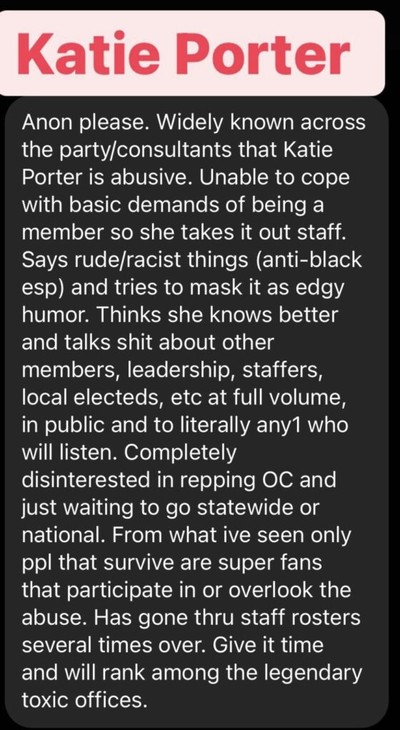Last December there was a story circulating that Katie Porter had fired a staffer for giving her COVID. The real story turned out to be a bit more complicated. The staffer in question, Sasha Georgiades, didn’t work for Porter but was a fellow sponsored by a wounded warrior program. So Porter couldn’t have fired her but did remove her from the office permanently.
In the midst of that, Georgiades argued that Porter was a pretty terrible boss in general:
“She has made multiple staffers cry and people are generally so anxious to even staff her because if ANYTHING goes wrong she flips out on whatever staffer is present,” Georgiades said. “She just talks to staffers however she wants.”…
The former Porter staffer said the congresswoman’s office will “overburden the staffer with work so it either comes to a point that they can’t juggle it all or they are fired for not keeping up” and noted this “happened shortly after I got there with another staffer.”
And that led to even more former Porter staffers coming forward and telling stories about their time in her office:


As you may know, Porter is now one of several Democrats running for the California Senate seat being vacated by outgoing Sen. Dianne Feinstein. Today the Washington Post ran a story which seems intended to clear away those pesky bad boss allegations for her campaign. The subhead of the story is “The California Democrat, famous for her viral confrontations, is admired by fans and resented by some ex-employees.” Eight paragraphs in, the excuses start:
For a while, this job made Porter’s life hard. And, in turn, Porter made difficult the lives of people in her orbit, according to murmurs that began in December, when Sasha Georgiades, a former military fellow in her Irvine office, alleged mistreatment of staff. That inspired self-described ex-staffers to send their own complaints about Porter to the “Dear White Staffers” Instagram account, a clearinghouse for anonymous, unverified harangues about congressional bosses…
Why is Porter trailed by this cloud of insinuation — and should it matter at all? How can leadership be properly judged in a world built with double standards, and wired with infinite triggers and sensitivities? What is the price of surviving and thriving in politics?
Cloud of insinuations? The author spoke to multiple people who gave first hand accounts. Before getting to those the author spends a bunch of paragraphs describing how Porter is a hero to the MSNBC set. Eventually he does come back to Porter’s critics, i.e. people who worked for her at some time who are still afraid to criticize her other than anonymously.
Here we get into tricky territory. My chat with the ex-staffer was revealing, and it prompted me to reach out to others. Four people — each formerly in Porter’s employ or orbit — told me about upsetting experiences working for her that spanned her first 3½ years in Congress; three additional former staffers told similar stories to one of my Washington Post colleagues. But to define the credibility of these seven sources, or to specify their allegations of “bad boss”-ness, is to give away their identities, which they do not want. Nobody wants to go public in ways they might regret.
“You’re not the first reporter I’ve talked to about Katie,” said one of Porter’s former campaign associates. “We all work in this industry, and nobody wants to ruin their career, and that’s the tough part. A lot of things were said to me and done to me, and it would be obvious they were done to me.”
“I personally like her a lot, and I personally would never work for her,” said the former senior House staffer from California, adding: “I love what she brings to the table, nationally. I’m really worried about what she brings to the table for the state.” Meaning that, for a senator to succeed, especially in representing a behemoth like California, her office needs stability and collegiality, this former staffer said. This has largely been the case for Sen. Dianne Feinstein’s some 30-year operation; this has not always been the case for Porter’s House office, according to interviews with former Porter staffers.
The Post feels these first hand accounts from seven former employees might need additional context. Is Porter domineering or just demanding? [emphasis added]
I tried to corroborate allegations that could not be fully corroborated, at least on the record, so I had broader, deeper conversations with a variety of people about what separates a demanding boss from a domineering one. About how female leaders are unfairly expected to have a baseline of maternal warmth. About why the pressures of working in Congress can hobble a human at any level of authority. I thought about the subtitle of Porter’s book, “Politics Is Messier Than My Minivan,” which encapsulates the tension between the pressures of a high-powered job in public service and the demands of a divorced working mom’s home life.
The idea that Porter was initially overwhelmed by her duties is corroborated by the congresswoman herself, in her book. “I was doomed on day one,” Porter writes, adding: “I failed to wake up to get my kids off to school on time, and I left them unsupervised for the evening when I fell asleep at 6:00 p.m., badly jet-lagged.” Of her first year in office, she writes: “I felt like a toddler, powerless against forces that were stronger than me, and out of solutions except rage.”
“I heard that last week was a cry-heavy week for everyone,” wrote one staffer to colleagues during Porter’s second month in office, according to an email shared with me.
The general idea seems to be that she was stressed and she lashed out at people around her but a current staffer, also anonymous, claims she has “improved significantly” as a boss. I can’t help but notice that all of the people who complained have left and those still working for her aren’t complaining. That could be interpreted as proof she has improved or it could be seen as evidence that people still on the payroll don’t want to risk talking bad about the boss.
The story wraps up with another 8-10 paragraphs describing what a rock star Porter is. It’s frankly hard to think of another case where seven people come forward and complain an elected official is a terrible boss and all of that gets buried in the second half of the story. It’s the definition of burying the lede. And even then, the whole thing is spun into a tale of growing pains designed to get Porter off the hook for her own behavior.







Join the conversation as a VIP Member